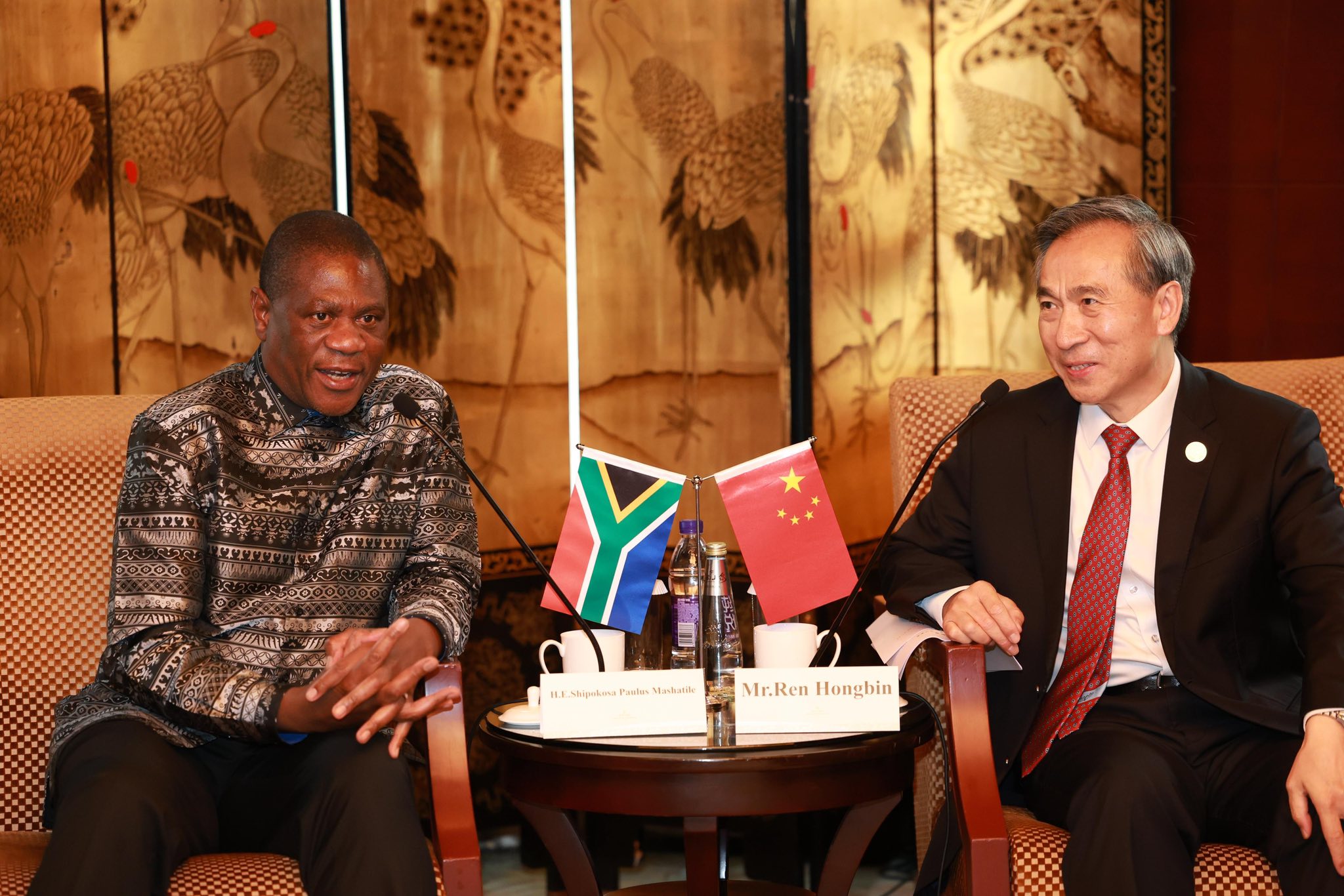Africa Leads G20: SA Calls for Green Tech, Digital Trade at China Expo
Taking over the G20 chair from Brazil, South Africa is the first African country to lead the influential bloc since the African Union (AU) was formally included as a permanent member in 2023.

- Country:
- South Africa
As Chair of the Group of 20 (G20) for 2025, South Africa is placing inclusive economic growth, job creation, and sustainable development at the heart of its international agenda, Deputy President Paul Mashatile said during his address at the opening ceremony of the China International Supply Chain Expo (CISCE) in Beijing on Wednesday.
Mashatile’s keynote speech emphasized that South Africa’s leadership in the G20 will reflect the aspirations of the Global South, particularly in driving green industrialisation, digital infrastructure development, and sustainable investment strategies. The CISCE, one of China’s premier trade and innovation events, provided a fitting platform for South Africa to invite stronger international cooperation in transforming supply chains and fostering equitable growth.
“South Africa firmly believes that the establishment of enduring business relationships must occur within the framework of a fair, inclusive, and rules-based global economic order,” Mashatile told delegates gathered in Beijing.
SA’s G20 Presidency: A Development-Centered Vision
Taking over the G20 chair from Brazil, South Africa is the first African country to lead the influential bloc since the African Union (AU) was formally included as a permanent member in 2023. As such, Pretoria is seizing this historic moment to spotlight Africa’s development needs and strengthen South-South cooperation with long-standing strategic partners such as China.
Mashatile underlined that industrialisation, green energy transitions, and digital trade would be core to South Africa’s G20 agenda. These themes, he noted, align closely with the focus of the CISCE, which showcases the latest innovations and trends in global supply chain management.
“This order should prioritise industrialisation, investment in green technologies, and digital infrastructure as key components of sustainable development, especially for developing economies,” Mashatile said.
China–Africa Cooperation in the G20 Framework
During his speech, Mashatile extended an invitation to Chinese investors and policymakers to actively engage in key pillars of South Africa’s G20 programme, particularly by supporting green and digital economic transformation on the African continent. He encouraged investments in renewable energy, regional manufacturing zones, and emerging digital ecosystems across Africa.
“Through such collaboration, we can deepen our strategic partnership and ensure that the outcomes of South Africa’s G20 Presidency reflect the shared aspirations of the Global South,” he added.
China has been South Africa’s largest trading partner for over a decade, and their bilateral ties have continued to deepen through forums such as the BRICS bloc, the Forum on China–Africa Cooperation (FOCAC), and now the G20.
Global Platform for African Supply Chains
Looking ahead, the Deputy President announced that South Africa will host a procurement mission on the sidelines of the G20 Leaders’ Summit in November 2025, which will bring together international buyers, importers, and distributors to explore trade opportunities with African firms.
“We urge all stakeholders to seize these opportunities, foster partnerships, share best practices, and collectively shape the future of supply chain management to build a more connected, resilient, and prosperous world,” Mashatile said.
This initiative aims to boost the visibility of African producers and manufacturers in global supply chains and position the continent as a viable hub for sustainable and digitally integrated value chains.
G20’s Global Weight and Africa’s Role
The G20 is the world’s premier economic cooperation forum, composed of 19 major countries and two regional bodies: the European Union (EU) and the African Union (AU). Together, these members account for:
-
85% of global GDP
-
Over 75% of international trade
-
Two-thirds of the global population
South Africa, the only African country in the original G20 group, has now taken on a new mantle of continental leadership with the AU’s full inclusion. Its 2025 presidency is expected to be a turning point for embedding Africa’s economic priorities into global governance structures.
A Pivotal Year for South Africa on the World Stage
Deputy President Mashatile’s engagement at CISCE sets the tone for a dynamic and ambitious G20 Presidency. With the backing of major partners like China, South Africa aims to spearhead an agenda rooted in fairness, innovation, and inclusive growth. From advocating for sustainable energy to unlocking African digital trade, Pretoria is preparing to reshape how developing nations engage with the global economy—and the G20 may never be the same again.
ALSO READ
Visa Denials Plague Global South in International Summits
NRF, ISTIC and UNESCO Forge STI Pact to Boost Research in Global South
India’s Strides in Sustainable Development: A Dual Strategy
India ready share AI models with Global South: IT Secretary S Krishnan
UN forum affirms stronger commitment to achieve sustainable development










